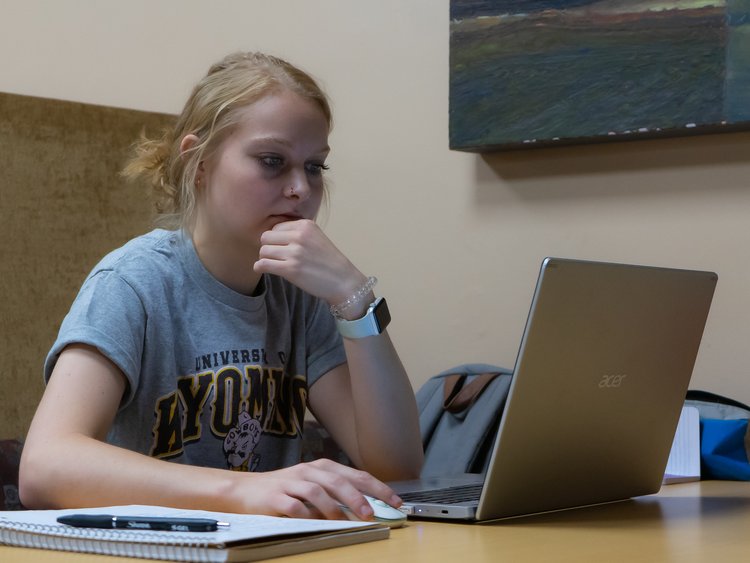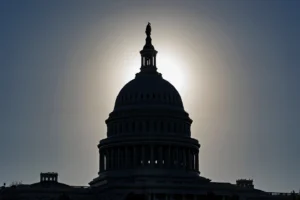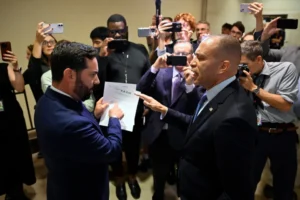University of Wyoming Students Not as Politically Driven on Choice of Roommates and Partners as Peers Nationwide
82% of students surveyed said they would opt to live with someone who voted differently
- Published In: Politics
- Last Updated: Sep 03, 2022

Lucy Kirkley (left), 21, an English and education major, and Chloe Baker, 22, a communications major, head to class after chatting over coffee in the Wyoming Union. Baker said that she would live with or date someone who holds different, but not extremist, political beliefs, because it’s healthy to be exposed to a variety of perspectives. (Wyoming Truth photo by Kaycee Clark)
By Kaycee Clark-Mellott
Special to the Wyoming Truth
LARAMIE, Wyo.—A Wyoming Truth survey of University of Wyoming students found that 82% would choose to room with someone who votes differently and 72% would date someone who votes differently—results that diverge from a recent national poll.
By contrast, an NBC News / Generation Lab online survey found that 46% of college sophomores wouldn’t choose to share a room with someone who voted differently in the 2020 presidential election. Democrats are more strongly opposed to rooming with a Republican, with 62% saying “probably not” or “definitely not.” Comparatively, only 28% of Republican respondents were opposed to sharing a dorm room with a Democrat, according to the NBC / Generation Lab survey.
In the Wyoming Truth survey of 50 undergraduate and graduate students, 92% of respondents who most closely identify as Republicans said they would opt to live with a Democrat or someone who supported a different 2020 presidential candidate. In comparison, only 70% of Democrats said they were willing to have a roommate with divergent political beliefs.

“It could be a ‘Trump effect,’ where maybe it was just that presidential candidate kind of leading the push towards saying, ‘No, I just can’t move in with someone who voted for him,’” said Kristen Landreville, professor of political communication at UW, about why Democrats might be more reluctant to live with Republicans.
Hazel Homer-Wambeam, 21, president of the Progressive Students of the University of Wyoming, said she would room with a Republican, but not someone who supports former President Donald Trump. For her, there is a “fuzzy line” between who she would and wouldn’t live with, and she would need to make the decision on a case-by-case basis.
“If [a roommate] wanted to have a ‘Trump 2024’ or [anti-Biden] flag on their bedroom wall, then I would not be comfortable living with them,” said Homer-Wambeam, a senior theater and dance major from Laramie.
On the question of dating someone with different political views, 72% of UW students surveyed would do so, while only 43% of NBC / Generational Lab respondents would.
At UW, 76% of Republican respondents and 65% of Democrat respondents said they would date someone who identifies with the other party and/or voted differently than they did in 2020.
“I think we oftentimes get caught up on the label of Republican or Democrat and kind of lose sight of the fact that we’re just all people, we’re all Americans,” said Ashton Love, former president of Turning Point USA’s UW chapter. “We have a lot more in common than what’s portrayed out in the news and what we’re told.”
Lydia Looby, 18, a first-year chemical engineering major from Cheyenne, said that politics aren’t everything and shouldn’t impact a relationship—friendly or intimate. Looby, along with several other students, used the phrase “agree to disagree” to navigate relationships.
Jim King, a professor in the UW Political Science department, said neither the NBC / Generation Lab nor UW survey are necessarily representative of the country and what current college students believe isn’t a projection of our society.
“Young people tend to be very firm and absolute in their positions,” King told the Wyoming Truth, “and as they grow and their life experiences expand, they could see the world differently.”
A simple key to easing the partisan divide could be to talk politics with people on the other side, but tread carefully.
“Don’t go to the conversation with a goal to change their mind,” Landreville advised. “If you just ask questions and listen, and then share your story, why your life experiences are guiding your politics, that could be a key to really unlocking a better and a healthier way to engage in politics and political conversations . . .”













